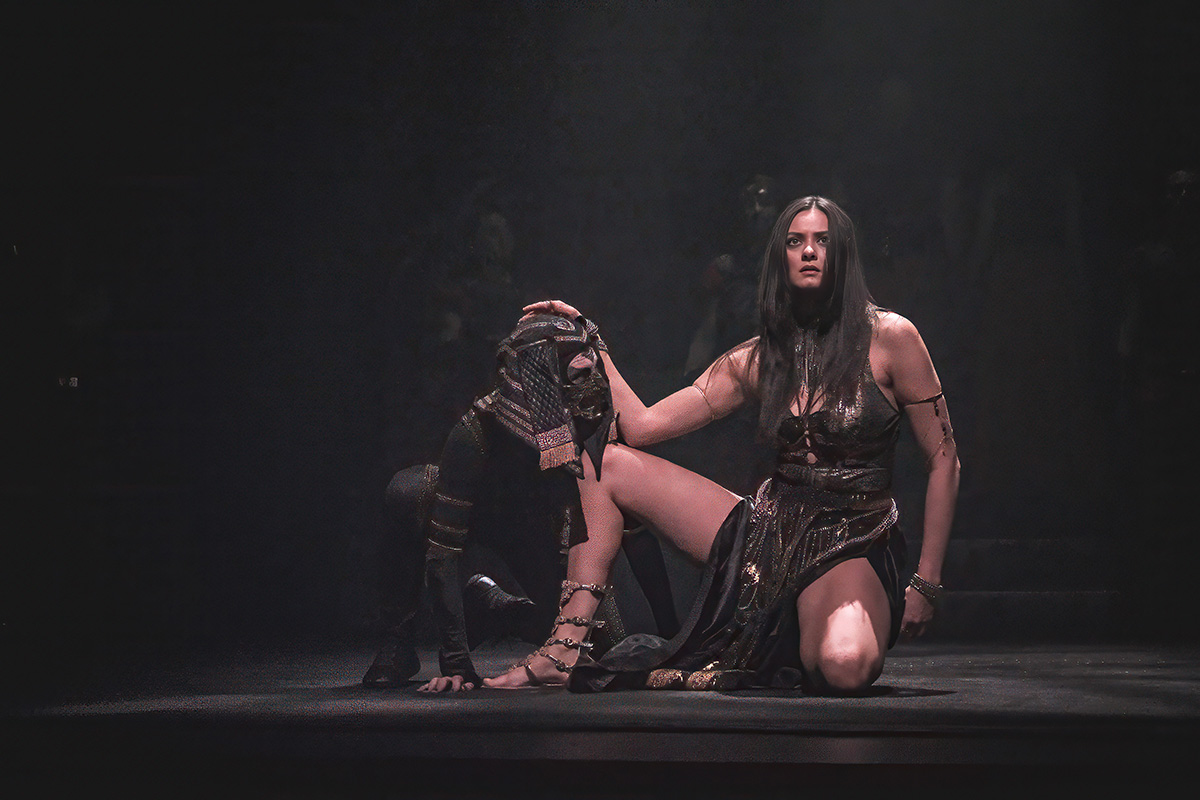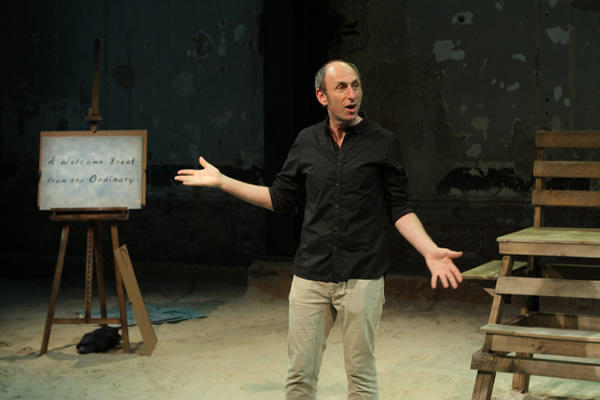Arts & Entertainment
Down by the seashore
Studio’s one-man show a clever exploration of longing and passion

‘The History of Kisses’
Through July 3
The Studio Theatre, 1501 14th St. NW
202-332-3300
www.studiotheatre.com‘Purge’
Through July 3
SCENA Theatre
at H Street Playhouse, 1365 H St. NE
703-683-2824 begin_of_the_skype_highlighting
www.scenatheater.org
Standing on a stage disguised as a stretch of sandy beach, a lone actor dressed in casual street clothes breaks out into his rendition of an old English seafarer’s chantey. He beckons his listeners to follow him to unknown places and because his song is so full of longing, promise and mystery, we gladly go along for the journey.
“The History of Kisses” — David Cale’s terrific one-man show making its world premiere at Studio Theatre — is a collection of interconnected monologues detailing mostly random erotic encounters that take place close to and on the ocean. The work’s central and most likable character James (a gay writer like Cale) is temporarily holed-up in a seaside California motel working on a collection of stories about desire and epiphany. His motel neighbors and a few more established friends are the subject of his intimate sketches.
Slim and bald, Cale (who not only performs but wrote the show) wholly inhabits his characters whether it’s Julie, a generally sensible woman who happily recalls her brief but memorable affair with a sexy fat man she picked up on a flight from New York to San Francisco; or Artie, an old married builder from New York who shares about a long ago, chance romantic encounter with Judy Garland on the beach in Malibu.
Moments move from funny to poignant. In a dream sequence, Cale transforms into an Australian surfing Adonis who doubles as the motel’s front desk clerk and funnily gives pointers on how to physically please a “Sheila” (i.e. woman in his Aussie jargon). That same surfer is later brokenhearted when his new married girlfriend dumps him, but ultimately finds dramatic renewal from the sea when he’s literally uplifted by a herd of whales. Love-weary James shares his own chance encounter with a middle-aged dentist who has recently come out.
Cale is a masterful storyteller. His long and impressive bio includes films, Broadway and music. He’s written lyrics for Elvis Costsello and Deborah Harry. “The History of Kisses” is his fourth solo work he’s done at Studio. While here and there British-born Cale’s American accents are a little shaky, the way in which he captures his characters’ physicality is uncanny — he can play both older women and young studs convincingly. His quirky, vulnerable subjects are finely drawn. The material is personal, fun, and even a little heartbreaking. Ultimately, Cale offers an inspiring testimony to human resilience.
Across town at the H Street Playhouse where SCENA is presenting Finnish-Estonian playwright Sofi Oksanen’s “Purge,” life is dangerous and memories are more painful. Set in both 1991 Estonia as well 1950s Estonia under Soviet rule, the bold drama tells the story of three generations of women who are the victims of sexual violence and the ongoing trauma that ensues.
Tucked away in her rustic, neatly tended dwelling old Aliide (Kerry Waters) bides her time in a changing world. Despite misgivings, she gives refuge to Zara (Colleen Delaney), a badly beaten woman on the run from pimps. In flashbacks we learn the old woman’s younger self (Irina Koval) and her young niece were once abused by Soviet soldiers.
While most of the work’s horrific violence is implied, interestingly the work’s most combative scene is a knock down drag out fight pitting Zara against old Aliide. The altercation, which includes Zara shoving the old woman’s heads in a full bed chamber, actually leads to the two women fully understanding one other, forging a bond and in the end, redemption.
To portray the tale’s strong women, director Robert McNamara has assembled an impressive trio: Waters and Koval are equally strong yet flawed as young and old Aliide. Delaney is known for giving theatergoers their money’s worth, and her emotionally strung out Zara is no exception. Eric Lucas offers some comic relief as Aliide’s communist doctrinaire husband, and Lee Ordeman is appropriately handsome and restless as young Aliide’s unrequited love. Stas Wronka and Armand Sindoni play the heavies (Soviet soldiers and pimps).
The playwright Oksanen identifies as bisexual. In 2009 she received an award from the organizers of Helsinki Pride for her activism on behalf of LGBT people in the Baltic states (Estonia, Latvia, Lithuania) and Russia. “Purge” also exists as a novel and a French film version is set to be released in 2012.
Theater
Voiceless ‘Antony & Cleopatra’ a spectacle of operatic proportions
Synetic production pulls audience into grips of doomed lovers’ passion

‘Antony & Cleopatra’
Through Jan. 25
Synetic Theater at
Shakespeare Theatre Company’s Klein Theatre
450 7th St., N.W.
Synetictheater.org
A spectacle of operatic proportions, Synetic Theater’s “Antony & Cleopatra” is performed entirely voiceless. An adaptation of the Bard’s original (a play bursting with wordplay, metaphors, and poetic language), the celebrated company’s production doesn’t flinch before the challenge.
Staged by Paata Tsikurishvili and choreographed by Irina Tsikurishvili, this worthy remount is currently playing at Shakespeare Theatre Company’s Klein Theatre, the same venue where it premiered 10 years ago. Much is changed, including players, but the usual inimitable Synectic energy and ingenuity remain intact.
As audiences file into the Klein, they’re met with a monumental pyramid bathed in mist on a dimly lit stage. As the lights rise, the struggle kicks off: Cleopatra (Irina Kavsadze) and brother Ptolemy (Natan-Maël Gray) are each vying for the crown of Egypt. Alas, he wins and she’s banished from Alexandria along with her ethereal black-clad sidekick Mardian (Stella Bunch); but as history tells us, Cleopatra soon makes a triumphant return rolled in a carpet.
Meanwhile, in the increasingly dangerous Rome, Caesar (memorably played by Tony Amante) is assassinated by a group of senators. Here, his legendary Ides of March murder is rather elegantly achieved by silver masked politicians, leaving the epic storytelling to focus on the titular lovers.
The fabled couple is intense. As the Roman general Antony, Vato Tsikurishvili comes across as equal parts warrior, careerist, and beguiled lover. And despite a dose of earthiness, it’s clear that Kavsadze’s Cleopatra was born to be queen.
Phil Charlwood’s scenic design along with Colin K. Bills’ lighting cleverly morph the huge pyramidic structure into the throne of Egypt, the Roman Senate, and most astonishingly as a battle galley crashing across the seas with Tsikurishvili’s Antony ferociously at the helm.
There are some less subtle suggestions of location and empire building in the form of outsized cardboard puzzle pieces depicting the Mediterranean and a royal throne broken into jagged halves, and the back-and-forth of missives.
Of course, going wordless has its challenges. Kindly, Synectic provides a compact synopsis of the story. I’d recommend coming early and studying that page. With changing locations, lots of who’s who, shifting alliances, numerous war skirmishes, and lack of dialogue, it helps to get a jump on plot and characters.
Erik Teague’s terrific costume design is not only inspired but also helpful. Crimson red, silver, and white say Rome; while all things Egyptian have a more exotic look with lots of gold and diaphanous veils, etc.
When Synetic’s voicelessness works, it’s masterful. Many hands create the magic: There’s the direction, choreography, design, and the outrageously committed, sinewy built players who bring it to life through movement, some acrobatics, and the remarkable sword dancing using (actual sparking sabers) while twirling to original music composed by Konstantine Lortkipanidze.
Amid the tumultuous relationships and frequent battling (fight choreography compliments of Ben Cunis), moments of whimsy and humor aren’t unwelcome. Ptolemy has a few clownish bits as Cleopatra’s lesser sibling. And Antony’s powerful rival Octavian (ageless out actor Philip Fletcher) engages in peppy propaganda featuring a faux Cleopatra (played by Maryam Najafzada) as a less than virtuous queen enthusiastically engaged in an all-out sex romp.
When Antony and Cleopatra reach their respective ends with sword and adder, it comes almost as a relief. They’ve been through so much. And from start to finish, without uttering a word, Kavsadze and Tsikurishvili share a chemistry that pulls the audience into the grips of the doomed lovers’ palpable passion.
Out & About
Love board games and looking for love?

Quirk Events will host “Board Game Speed Dating for Gay Men” on Thursday, Jan. 22 at 7 p.m. at KBird DC.
Searching for a partner can be challenging. But board games are always fun. So what if you combined board games and finding a partner?
Picture this: You sit down for a night of games. A gaming concierge walks you through several games over the course of the night. You play classics you love and discover brand new games you’ve never heard of, playing each with a different group of fun singles. All while in a great establishment.
At the end of the night, you give your gaming concierge a list of the folks you met that you’d like to date and a list of those you met that you’d like to just hang out with as friends. If any two people put down the same name as each other in either column, then your gaming concierge will make sure you get each other’s e-mail address and you can coordinate a time to hang out.
Tickets cost $31.80 and can be purchased on Eventbrite.

Friday, January 16
Friday Tea Time will be at 12 p.m. at the DC Center for the LGBT Community. This is a social hour for older LGBTQ+ adults. Bring your beverage of choice. For more information, contact Mac ([email protected]).
Trans and Genderqueer Game Night will be at 7 p.m. at the DC LGBTQ+ Community Center. This is a relaxing, laid-back evening of games and fun. For more details, visit the DC Center’s website.
Go Gay DC will host “LGBTQ+ Social in the City” at 7 p.m. at Hotel Zena. This event is ideal for making new connections and community building or just to unwind and enjoy extended happy hour. Attendance is free and more details are available on Eventbrite.
Saturday, January 17
Go Gay DC will host “LGBTQ+ Community Brunch” at 11 a.m. at Freddie’s Beach Bar & Restaurant. This fun weekly event brings the DMV area LGBTQ+ community, including allies, together for delicious food and conversation. Attendance is free and more details are available on Eventbrite.
The DC LGBTQ+ Community Center and SMYAL will host a free film screening of “Mama Bears” celebrating queer youth, resilience, and the power of living authentically. Whether you’re a movie lover, looking to make new friends, or simply want a safe, affirming space to relax, this event is for you. Click this link to RSVP.
LGBTQ People of Color will be at 7 p.m. on Zoom. This peer support group is an outlet for LGBTQ people of color to come together and talk about anything affecting them in a space that strives to be safe and judgement free. There will be all sorts of activities like watching movies, poetry events, storytelling, and just hanging out with others. For more details, visit thedccenter.org/poc or facebook.com/centerpoc.
Sunday, January 18
Go Gay DC will host “LGBTQ+ Community and Conversation” at noon at As You Are. This event is for those looking to make more friends and meaningful connections in the LGBTQ+ community. Look for the Go Gay DC sign on the long table near the front window. Attendance is free and more details are available on Eventbrite.
Monday, January 19
“Center Aging: Monday Coffee Klatch” will be at 10 a.m. on Zoom. This is a social hour for older LGBTQ adults. Guests are encouraged to bring a beverage of choice. For more information, contact Adam ([email protected]).
Tuesday, January 20
Center Bi+ Roundtable will be at 7 p.m. on Zoom. This is an opportunity for people to gather in order to discuss issues related to bisexuality or as Bi individuals in a private setting.Visit Facebook or Meetup for more information.
Tae Kwon Do Class with Avi Rome will be at 12:30 p.m. This inclusive and beginner-friendly class, led by Instructor Avi Rome, offers a light warm-up, stretching, and instruction in basic techniques, patterns, and striking padded targets. Each session is designed to be adaptable for all ability and mobility levels, creating a welcoming space for everyone to build strength, confidence, and community through martial arts. For more details, visit the DC Center’s website.
Wednesday, January 21
Job Club will be at 6 p.m. on Zoom upon request. This is a weekly job support program to help job entrants and seekers, including the long-term unemployed, improve self-confidence, motivation, resilience and productivity for effective job searches and networking — allowing participants to move away from being merely “applicants” toward being “candidates.” For more information, email [email protected] or visit thedccenter.org/careers.
Thursday, January 22
The DC Center’s Fresh Produce Program will be held all day at the DC Center for the LGBT Community. People will be informed on Wednesday at 5 p.m. if they are picked to receive a produce box. No proof of residency or income is required. For more information, email [email protected] or call 202-682-2245.
Virtual Yoga Class will be at 7 p.m. on Zoom. This free weekly class is a combination of yoga, breathwork and meditation that allows LGBTQ+ community members to continue their healing journey with somatic and mindfulness practices. For more details, visit the DC Center’s website.
-

 Iran4 days ago
Iran4 days agoGrenell: ‘Real hope’ for gay rights in Iran as result of nationwide protests
-

 Congress5 days ago
Congress5 days agoVan Hollen speaks at ‘ICE Out for Good’ protest in D.C.
-

 LGBTQ Non-Profit Organizations5 days ago
LGBTQ Non-Profit Organizations5 days agoNational LGBTQ Task Force brings Creating Change conference back to D.C.
-

 Virginia4 days ago
Virginia4 days agoMark Levine loses race to succeed Adam Ebbin in ‘firehouse’ Democratic primary





















